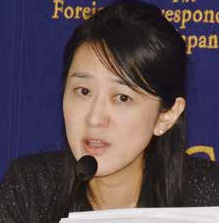Issue:
Riko Muranaka says the vaccine can help save the lives of 3,000 young women a year, but a libel lawsuit seems aimed at silencing support for its use.
JAPAN’S REFUSAL TO OFFICIALLY recommend a vaccine that protects against cervical cancer is a threat to thousands of women who contract the illness every year, according to medical doctor and journalist Riko Muranaka, whose campaign to prove the drug’s safety has landed her in court.
Muranaka, a lecturer at Kyoto University’s school of medicine, is now fighting a libel suit after she accused Shuichi Ikeda, dean of the school of medicine at Shinshu University, of “fabricating” the results of an experiment with a single mouse that he then used to “prove” that the human papilloma virus (HPV) vaccine causes serious neurological conditions.
Ikeda, who had been given a grant by the health ministry to investigate alleged adverse side effects, insisted on a causal link in a TV appearance, generating alarmist newspaper headlines the following day.
The HPV jab was made available for free in late 2010 for girls between 12 and 16 years old, and became part of Japan’s national immunization program in early 2013. But just two months later, the health and welfare ministry made what Muranaka called the “unusual and perplexing” decision to keep the vaccine in the program but suspend “proactive” recommendations for it.
The decision followed Ikeda’s claim and the release of a video by a group of alleged victims showing vaccinated women with serious neurological symptoms.
Since the ministry suspended its recommendation, the vaccination rate among the target age group has plummeted from 70 percent to less than 1 percent.
IN AN ARTICLE IN Wedge magazine in March of this year, Muranaka accused Ikeda of fabricating the data. “Doctor Ikeda’s data is not just about one mouse experiment,” Muranaka said at the FCCJ in November. “It is about the consequences it has for 10,000 women and their families who get cervical cancer every year in Japan, and the 3,000 women who die from it.”
“Because of his actions, more young women have decided not to get a safe and effective vaccine [that could] save their lives,” said Muranaka, whose case is not expected to reach a verdict for at least another 18 months. “I would like to ask Dr. Ikeda if he feels any responsibility for this.”

She said that the epidemiological data from around the world has shown no increase in the vaccinated group for specific diseases such as neurological diseases or auto-immune diseases. And a health ministry task force subsequently ruled out a causal link between HPV vaccine and the professed symptoms, adding that the reported cases were most likely psychosomatic. Despite those findings, the government has not made a “proactive recommendation” to reintroduce the vaccine into the immunization program.
The ministry’s decision has been criticized by the World Health Organization, which fears that dubious claims about harmful side effects could lead to a global drop in vaccinations and a rise in cervical cancer cases. There is evidence that the controversy in Japan has already hit vaccination rates in Denmark and Ireland. Worldwide, about 528,000 new cases of cervical cancer are reported annually, causing 266,000 deaths. In Japan 9,300 cases of invasive cervical cancer cause 3,000 deaths a year.
While the libel case continues, the health ministry has publicly accused Dr. Ikeda of “causing misunderstanding.” According to an oped by Muranaka in the Wall Street Journal, the ministry statement said: “We are truly sorry his inappropriate presentation caused misunderstanding to society. Ikeda’s social responsibility is big. We found no evidence to suggest reported symptoms are related to the HPV vaccine.
MURANAKA, WHO IS PAYING her own legal fees while accepting donations from a support group, believes many of the 3,000 Japanese women who die from cervical cancer every year could have been saved by the vaccine. She accused her opponents of “sowing the seeds for misunderstanding about the safety of the HPV vaccine that persists to this day.”
To support the claims she has made in numerous papers and articles, she cited a study of 70,960 vaccinated and nonvaccinated adolescent girls in Nagoya that found “no significant associations between 24 alleged vaccine-induced symptoms and the HPV vaccines.”
Muranaka said that she had been unfairly targeted by opponents, and that other doctors who support her stance are too scared to speak out in case they too end up in court. “Publishers refused to publish my articles, and declined to publish a book, even though they had agreed to do so,” she said. “One magazine ended my regular column since they don’t want to be involved.”
She scolded Japan’s medical society and the media for their silence. “I have asked Doctor Ikeda time and again to publish more details about his experiment and the original data, but he has failed to comply,” she said. “I hope the court will understand that the lawsuit was not the right thing to do, because Ikeda should have refuted my claims in the scientific realm. I’m happy to discuss this with him within the scientific community, but he won’t do that.”
Muranaka said that her single aim is for Japan’s government to comply with global expectations and global standards. “The voices of the victims are echoing around the world, but scientific journalists have to do the same we have to make our voices heard around the world and publish science-based articles, or else people’s health will be at risk.”
Justin McCurry is Tokyo correspondent for the Guardian and Observer newspapers in London and writes about Japan and Korea for the Lancet medical journal.

